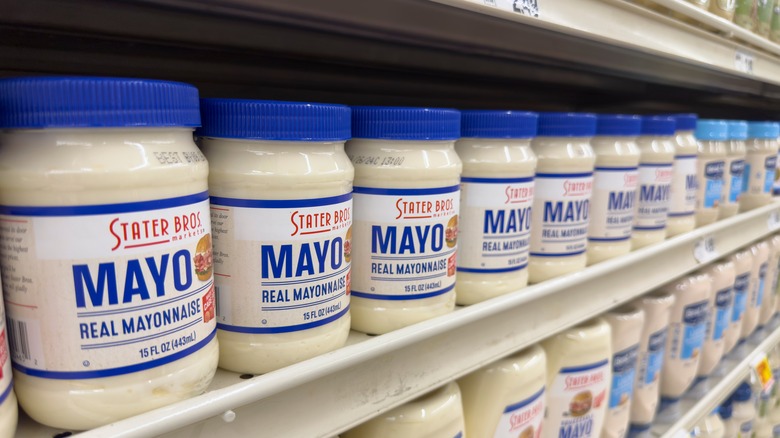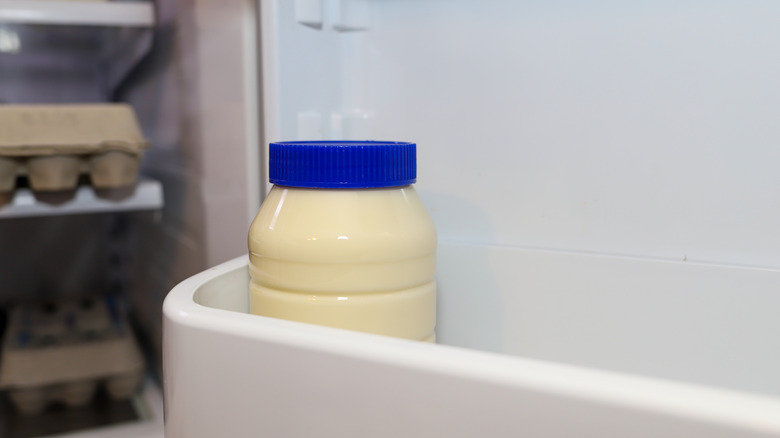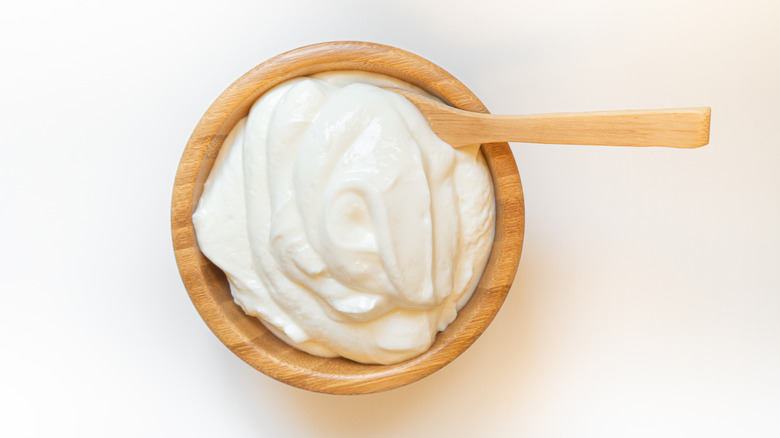Does Store-Bought Mayo Spoil Faster Than Homemade?
Whether you're adding some moisture to a classic club sandwich or binding together the ingredients of a tuna salad, mayonnaise is a useful kitchen essential with many applications. Although it's a widely-available provision sold at almost every supermarket in various forms — from sriracha-infused types to vegan iterations — making mayonnaise at home gives you more agency over its flavor, texture, and nutritional makeup. But no matter which type you go for, both packaged and scratch-made mayo are perishable items, which begs the question: Does store-bought mayo spoil faster than homemade?
Store-bought mayonnaise actually does not spoil quicker than its homemade counterpart. In fact, the latter spoils significantly faster than the former. Store-bought mayo is shelf-stable at room temperature for a considerable amount of time (with the exact period varying between products) until it's been opened, after which it can last for up to two months in the refrigerator. On the other hand, homemade mayonnaise should be refrigerated and consumed within four days.
Store-bought mayonnaise lasts longer than homemade because it is usually manufactured with natural and/or chemical preservatives such as citric acid, vinegar, and sorbic and benzoic acid. Supermarket mayo is also made with pasteurized eggs that have been heat-treated to kill harmful bacteria — which further reduces the risk of pathogen contamination or spoilage.
Maximizing mayonnaise shelf life
Regardless of which type you have on hand, there are a few tips worth keeping in mind to maximize the lifespan of both store-bought and homemade mayonnaise. After all, food waste is the greatest culinary faux pas. Firstly, when it comes to homemade mayonnaise, always use pasteurized eggs. Those that are unpasteurized are more likely to harbor bacteria in their raw form. Unfortunately, eggs cannot be pasteurized at home, so you'll need to search for these at the store.
Additional acidic components like lemon juice and apple cider vinegar can improve the flavor of your homemade mayonnaise with a tangy twist while simultaneously functioning as preservatives, slowing the growth of bacteria. Once you've made your mayonnaise, store leftovers in an air-tight container and label and date it to track the freshness.
Both homemade and store-bought mayonnaise should be stored in a refrigerator set to at least 40 degrees Fahrenheit after preparing and opening, respectively. Limit exposure to warmer temperatures and discard mayo of any variety if it has sat out of the refrigerator for more than two hours (via U.S. Food Safety and Inspection Service). Avoid cross-contamination by using clean utensils when scooping out mayonnaise; ensuring the container is free from any lingering food residue; and not dipping any food (whether it be fries, veggies, or others) directly into the jar.
Signs of spoiled mayonnaise
Proper mayo storage and handling is the most efficient way to maximize its shelf life, but recognizing signs of spoilage is equally important. Food safety mistakes can be dangerous, but conveniently, the red flags are consistent between store-bought and homemade mayonnaise.
Fresh mayonnaise should have a creamy, off-white color. Yellowing, browning, and any other discoloration are quintessential signs of spoilage. Similarly, fresh mayonnaise boasts a rich, slightly sweet smell and should be free from any rancid, sour, or generally disagreeable aromas. If you notice mold, discard the mayo immediately, and soak any reusable storage containers in a bleach-water solution for at least 30 minutes to get rid of lingering spores.
Changes in texture can also indicate spoiled mayonnaise. Lumps, bumps, or a layer of oil that has separated from the emulsion are all red flags. If mayonnaise isn't a frequent flyer in your meal rotation, consider purchasing a store-bought variety. Or, at the very least, try making only small amounts of mayonnaise from scratch for individual recipes, to prevent food waste and the shorter shelf life from sneaking up on you.


